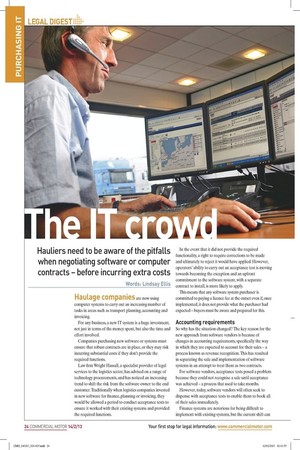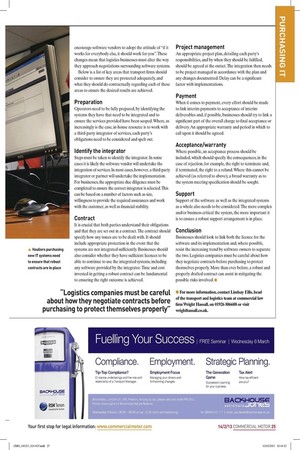Hauliers need to be aware of the pitfalls when neg
Page 13

Page 14

If you've noticed an error in this article please click here to report it so we can fix it.
Hauliers need to be aware of the pitfalls when negotiating software or computer contracts - before incurring extra costs Waras: unasay tuis Haulage companies are.usilig computer systems to carry out an increasing number of tasks in areas such as transport planning, accounting and invoicing.
For any business, a new IT system is a huge investment, not just in terms of the money spent, but also the time and effort involved.
Companies purchasing new software or systems must ensure that robust contracts are in place, or they may risk incurring substantial costs if they don't provide the required functions.
Law firm Wright Hassan, a specialist provider of legal services to the logistics sector, has advised on a range of technology procurements, and has noticed an increasing trend to shift the risk from the software owner to the end customer. Traditionally when logistics companies invested in new software for finance, planning or invoicing, they would be allowed a period to conduct acceptance tests to ensure it worked with their existing systems and provided the required functions.
In the event that it did not provide the required functionality, a right to require corrections to be made and ultimately to reject it would have applied. However, operators' ability to carry out an acceptance test is moving towards becoming the exception and an upfront commitment to the software system, with a separate contract to install, is more likely to apply.
This means that any software system purchaser is committed to paying a licence fee at the outset even if, once implemented, it does not provide what the purchaser had expected — buyers must be aware and prepared for this.
Accounting requirements So why has the situation changed? The key reason for the new approach from software vendors is because of changes in accounting requirements, specifically the way in which they are expected to account for their sales — a process known as revenue recognition. This has resulted in separating the sale and implementation of software systems in an attempt to treat them as two contracts.
For software vendors, acceptance tests posed a problem because they could not recognise a sale until acceptance was achieved — a process that used to take months.
However, today, software vendors will often seek to dispense with acceptance tests to enable them to book all of their sales immediately.
Finance systems are notorious for being difficult to implement with existing systems, but the current shift can encourage software vendors to adopt the attitude of "if it works for everybody else, it should work for you". These changes mean that logistics businesses must alter the way they approach negotiations surrounding software systems.
Below is a list of key areas that transport firms should consider to ensure they are protected adequately, and what they should do contractually regarding each of these areas to ensure the desired results are achieved.
Preparation Operators need to be fully prepared, by identifying the systems they have that need to be integrated and to ensure the services provided have been scoped. Where, as increasingly is the case, in-house resource is to work with a third-party integrator of services, each party's obligations need to be considered and spelt out.
Identify the integrator Steps must be taken to identify the integrator. In some cases it is likely the software vendor will undertake the integration of services. In most cases, however, a third-party integrator or partner will undertake the implementation. For businesses, the appropriate due diligence must be completed to ensure the correct integrator is selected. This can be based on a number of factors such as size, willingness to provide the required assurances and work with the customer, as well as financial stability.
Contract It is crucial that both parties understand their obligations and that they are set out in a contract. The contract should specify how any issues are to be dealt with. It should include appropriate protection in the event that the systems are not integrated sufficiently. Businesses should also consider whether they have sufficient licences to be able to continue to use the integrated systems, including any software provided by the integrator. Time and cost invested in getting a robust contract can be fundamental to ensuring the right outcome is achieved.
Project management An appropriate project plan, detailing each party's responsibilities, and by when they should be fulfilled, should be agreed at the outset. The integration then needs to be project managed in accordance with the plan and any changes documented. Delay can be a significant factor with implementations.
Payment When it comes to payment, every effort should be made to link interim payments to acceptance of interim deliverables and, if possible, businesses should try to link a significant part of the overall charge to final acceptance or delivery. An appropriate warranty and period in which to call upon it should be agreed.
Acceptance/warranty Where possible, an acceptance process should be included, which should specify the consequences, in the case of rejection, for example, the right to terminate and, if terminated, the right to a refund. Where this cannot be achieved (as referred to above), a broad warranty as to the system meeting specification should be sought.
Support Support of the software as well as the integrated systems as a whole also needs to be considered. The more complex and/or business-critical the system, the more important it is to ensure a robust support arrangement is in place.
Conclusion Businesses should look to link both the licence for the software and its implementation and, where possible, resist the increasing trend by software owners to separate the two. Logistics companies must be careful about how they negotiate contracts before purchasing to protect themselves properly. More than ever before, a robust and properly drafted contract can assist in mitigating the possible risks involved. • For more information, contact Lindsay Ellis, head of the transport and logistics team at commercial law firm Wright Hassan, on 01926 886688 or visit wrighthassall.co.uk.






























